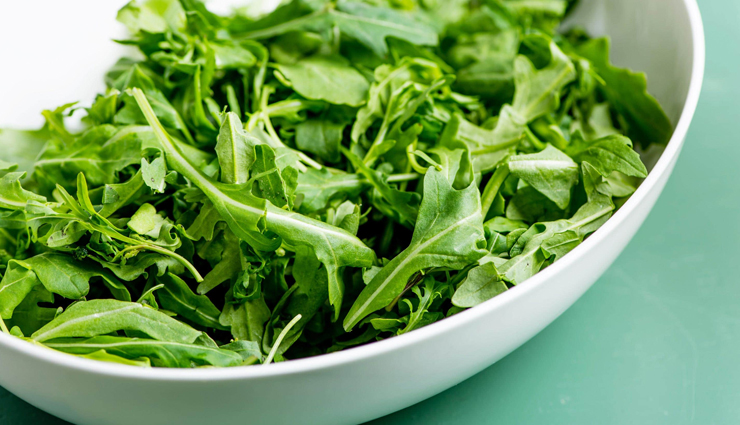- Home›
- Healthy Living›
- 5 Least Known Health Benefits Of Arugula
5 Least Known Health Benefits Of Arugula
By: Kratika Fri, 11 Nov 2022 12:54:16

Delicate, pointy green leaves that add a pungent, earthy flavor and loads of visual appeal to any respectable salad – that’s arugula for you! Also known as salad rocket or Italian cress, arugula (Eruca sativa) is of Mediterranean origin and belongs to the Brassica family of microgreens that include cabbage, kale, broccoli, and radish. Here’s why adding arugula to your food is not just about the flavor but offers you loads of health benefits too!

# Wards Off Cancer
Arugula, like other members of the cruciferous vegetable family, contains an arsenal of weapons against cancer:
- Indoles found in these microgreens help our bodies fight off various cancers.
- Antioxidants like ascorbic acid, flavonoids, and carotenoids eliminate cancer-causing free radicals.
- Glucosinolates, also a compound found in cruciferous vegetables, mixes with another enzyme when we chew arugula leaves and converts to isothiocyanates (ICTs). ICTs neutralize carcinogens in the body, cut their toxic effect, and stimulate the body’s production of other substances that attack carcinogens.
ICTs also prevent cell proliferation. Erucin, a type of ICT, has been found to inhibit proliferation of certain breast cancer cells. In fact, the effects of erucin have been found to be comparable to that of certain powerful anticancer drugs.
Research shows that glucosinolates are best eaten raw rather than as supplements. A good reason to generously scatter arugula in your salad!

# Keeps Bones Healthy And Strong
Think strong bones and spinach is what comes to mind for its calcium, right? Well, arugula has about the same quantity of the mineral. Where it scores over spinach is in the lower quantity of oxalates, a compound that inhibits the body from absorbing calcium. So leaf for leaf, you get more calcium from arugula than spinach.
Arugula also packs in vitamin K, another requirement for good bone health. The USDA recommends including vitamin K from green, leafy vegetables in your diet to prevent osteoporosis as well as inflammatory diseases. Vitamin K could also protect against fractures.

# Reduces Acidity And Protects Against Ulcers
Arugula may help curb high levels of acidity and protect against ulcers. According to one animal study, this could be due to its protective antioxidants as well as its anti-secretory properties that inhibit the excessive production of stomach acids. On the other hand, arugula extracts were also found to possess cytoprotective properties – they fortify the gastric mucosa by enhancing prostaglandin activity. This in turn increases gastric mucus secretion and thus prevents ulcer formation.

# Keeps Your Eyes Healthy
Arugula contains the carotenoids lutein and zeaxanthin, both essential for preventing age-related macular degeneration, cataract, and other eye diseases. Studies reveal that lutein has antioxidant and anti-inflammatory properties. Additionally, lutein concentration in the eyes helps fend off harmful blue light emission from mobile, computer and TV screens, thereby protecting your eyes from damage. Scientists strongly recommend incorporating this “eye vitamin” in our daily diets to maintain its concentration in the human lens and retina.

# Helps Manage Weight
Low calorie, low carb, and low glycemic – arugula, as one among the nutrient-dense, fiber-rich family of dark, green, leafy vegetables, ticks all the boxes when it comes to healthy weight management. Dietary fiber in this salad green – 1.6 g per 100 gm, about 6.4 percent of the recommended dietary intake – helps improve digestive health, regulate bowel movement, and keep your body weight in check.





